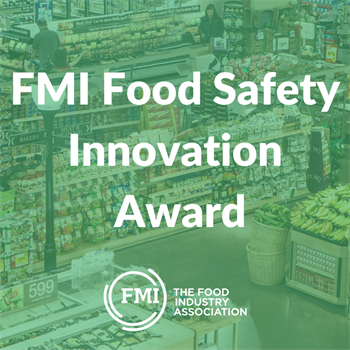By Ashley Eisenbeiser, MS, CFS, Senior Director, Food and Product Safety Programs, FMI
(Originally Published on FMI.org)

Emerging markets and technologies, as well as increasingly complex supply chains, drives the unabated need for safe, quality food to meet the changing tastes and expectations of consumers. Blockchain, machine learning, whole genome sequencing are just a few examples of innovations being leveraged to safeguard the food supply and protect public health. The food industry is embracing these advances and with the adoption of new, cutting-edge digital solutions and innovative, scientific tools, the future of food safety is promising.
FMI supports the advancement of food protection technologies and best practices throughout the supply chain in order assure our food is the safest it can be. In partnership with the International Food Protection Training Institute (IFPTI), we created the FMI Food Safety Innovation Award to recognize companies that have made an innovative contribution and commitment to food safety and to encourage others in the industry, government and academia to search for creative solutions and implement new practices in continuing to keep our food the safest it can be.
At our January 2021 FMI Food Protection Committee Meeting we recognized Amazon with the FMI Food Safety Innovation Award. Amazon has grown a culture of innovation through its Leadership Principles that drives the company to continue advancing food safety and compliance on behalf of its customers. Through its Customer Feedback Monitoring program, Amazon can listen to customer reviews, customer return comments, questions and answers, which helps drive its safety and compliance processes across all of our product lines. Amazon sees the value in emerging technologies and how it will help solve the problems of tomorrow.
To highlight key aspects of their innovative food safety program, I interviewed Allison Jennings, Director, Worldwide Food Safety, Compliance, & Quality at Amazon.
Tell us about your Leadership Principles. How do you apply these Leadership Principles to food safety?
Allison: “At Amazon, we use our Leadership Principles to hold ourselves and each other accountable for acting on behalf of our customers. Our unique culture helps us relentlessly pursue our mission of being Earth’s most customer-centric company, and one way we achieve that is through the Invent and Simplify Leadership Principle.
“Leaders expect and require innovation and invention from their teams and always find ways to simplify. They are externally aware, look for new ideas from everywhere, and are not limited by ‘not invented here.’ As we do new things, we accept that we may be misunderstood for long periods of time.”
How do customers play a role in food safety at Amazon?
Allison: “Our biggest driver of innovation is our customers themselves. With them in mind, we developed a program called Customer Feedback Monitoring, which listens to customer reviews, customer return comments, questions and answers, and customer service department contacts. This process drives our safety and compliance processes across all of our product lines.
“Customer Feedback Monitoring starts with a complex classification system. Through a tool called Heartbeat, Amazon continually monitors and analyzes more than 45 million pieces of customer feedback a week. As we are a global company, these controls scale across 14 languages, and we translate 54 languages back to English for broader coverage of our classification. When we receive a piece of customer feedback that mentions any food safety concern, our system immediately classifies it as a signal of a potentially serious safety issue. Once we identify a product that may be unsafe, we immediately stop selling it while we investigate and take appropriate action, including a recall when necessary.”
How does a Culture of Innovation impact food safety at Amazon?
Allison: “We are always looking for ways to Invent and Simplify. We go a step further and leverage customer feedback to train predictive systems that proactively assure safety for our customers.
“Inspired by the preventive controls in the Food Safety Modernization Act, we shifted our mindset from Reacting to Preventing through Predictive Controls. Rather than responding to safety-related events once they occur, the majority—actually 84%—of our product investigation work takes action to prevent the safety issues from ever occurring.
“Here’s how it works: Through our machine learning tools, we calculate the relative distance between products we sell and those that have received a safety-related concern. Where a positive correlation exists, we predict the severity of a potential issue and likelihood of a similar occurrence.
“Our proactive investigation process can lead to the same compliance outcomes as our reactive process: we stop selling the product and request documentation to substantiate food safety and compliance. To close the investigation, we either: Receive proof and reinstate the item, or we use our recalls tools to prevent the product from being relisted.”
As the 2020 FMI Food Safety Innovation Award, what does the future of food safety look like for the food industry?
Allison: “The future looks bright! We, like others, are constantly looking for ways to innovate on behalf of our customers in ways that will delight them and keep them safe throughout their shopping experience. It is very exciting to see how emerging technologies like artificial intelligence (AI), machine learning, the internet of things, and other technologies yet undiscovered are being leveraged across industry and government to drive innovation for us all – especially during these unprecedented times. We cannot wait to see what future innovations, tech and non-tech alike, emerge that will help us solve today’s most critical food safety issues.”

